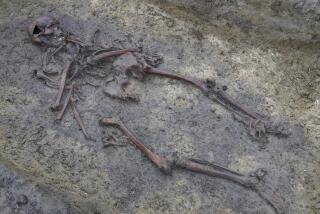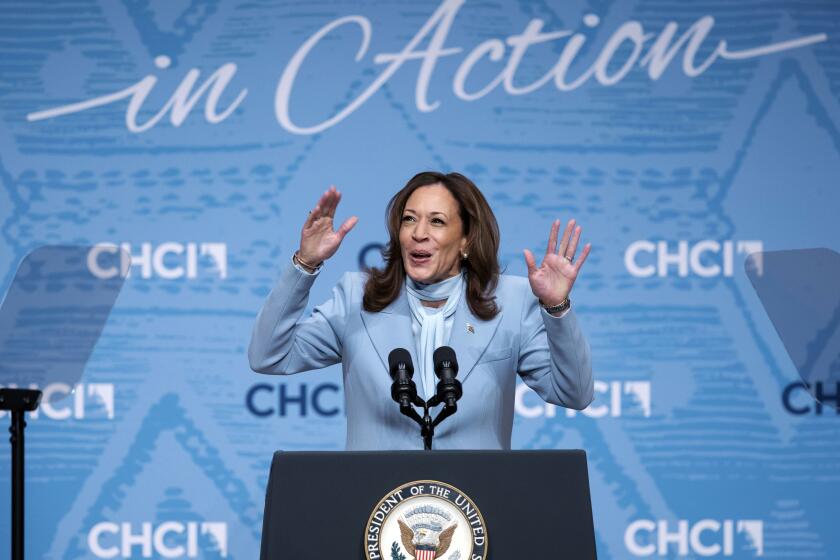4 More Soldiers Die in Iraq
Four American soldiers were killed late Thursday night and early Friday in two incidents -- a roadside bombing in Baghdad and a brief, fierce firefight between U.S. paratroopers and gunmen in this Shiite Muslim holy city south of the capital.
Their deaths brought to 336 the number of Americans reported killed since the war began March 20. The Karbala clash also marked the deadliest incident for U.S. troops since three soldiers were slain near Tikrit on Sept. 18.
The battle in this largely Shiite city began Thursday just before midnight and spilled into Friday.
U.S. commanders said the clash began when about 20 bodyguards for a relatively minor ayatollah, Mahmoud Hassani, opened fire on a joint Iraqi-American patrol that had gone to the cleric’s house to investigate reports of armed men in the streets after curfew. The bodyguards fired at the patrol from the roof of Hassani’s gated home, the officers said.
Within minutes, witnesses said, reinforcements from the U.S. Army’s 101st Airborne Division arrived and the fighting raged.
The battle took the lives of Cpl. Sean R. Grilley, 24, of San Bernardino; Staff Sgt. Joseph Bellavia, 28, of Wakefield. Mass.; and Lt. Col. Kim S. Orlando, a 43-year-old Persian Gulf War veteran from Tennessee, the Defense Department said. The three were assigned to the 716th Military Police Battalion, based at Ft. Campbell, Ky. Orlando was the battalion’s commanding officer.
A U.S. spokesman and Iraqi police said eight of the gunmen and an Iraqi police sergeant were also killed.
At least five Americans and two Iraqi policemen were wounded. Ten suspects were detained by U.S.-led forces.
One of the surviving bodyguards said the U.S.-led patrol opened fire first.
“The Americans came about 11:45 [p.m.],” said Sheik Haider, 20. “The squad consisted of four armored vehicles and stood in front of the house. They asked about our weapons through a translator. We told them we are protecting [Hassani’s] house. They wanted to disarm us, but we did not accept. They opened fire against us.”
An Iraqi police commander at the scene said of the bodyguards: “We know these people, and most are Baathists” loyal to the former regime of Saddam Hussein.
Hours later, in an attack in Baghdad, a soldier from the 220th Military Police Brigade was killed and two of his colleagues wounded in a bomb blast. The U.S. command provided no other details, but guerrillas opposed to the occupation of Iraq have increasingly used roadside bombs set off by remote control to harass and kill soldiers on patrol.
Elsewhere in Iraq on Friday, five U.S. troops were wounded when a roadside bomb exploded on a highway near the northern city of Mosul, a commander told Reuters news service.
Defense Secretary Donald H. Rumsfeld told an audience at the Ronald Reagan Presidential Library in Simi Valley last week that the continuing ability of resistance fighters to “terrorize and frighten” the Iraqi population had surprised him. But, he said, U.S.-led forces make about 1,700 patrols a day in Iraq and fewer than 1% are involved in any kind of armed conflict.
“It is a very low-intensity situation, percentage-wise. Nonetheless, people are getting killed,” he said.
Attacks on U.S. forces in Iraq average 20 a day, commanders say.
U.S.-led coalition forces had imposed a 9 p.m. curfew in Karbala this week after a number of deadly clashes between rival Shiite Muslim factions jockeying for influence in postwar Iraq. The Shiites, who represent about 60% of Iraq’s 24 million people, were ruthlessly suppressed by Hussein but are now flexing their muscle and sometimes battling one another for political power.
Some of the Shiite factions, such as the one led by cleric Muqtader Sadr, have armed wings that openly defy coalition bans on private armies and the carrying of unlicensed guns. This presents a dilemma for U.S. commanders, who seek to establish authority but don’t want to alienate the influential Shiite population.
Sadr, whose following is mostly young, poor and unemployed, has given fiery sermons denouncing the occupation but stopping short of calling for attacks on Americans.
Hassani also ran afoul of Hussein and was reportedly in jail when American forces entered the country in March.
Some U.S. military sources have suggested privately that commanders were preparing for a showdown with Sadr, who last week announced he had formed his own government and named a Cabinet. He later appeared to drop the idea after receiving little public support. But at Friday prayers in Najaf, about 50 miles southeast of Karbala, he again referred to his new government.
“The Americans are occupying Iraq for the benefit of Israel,” he told about 4,000 followers. “Stability in the Middle East cannot be achieved unless they give us a deadline for the end of occupation.”
*
Times staff writer Lamb reported from Baghdad and special correspondent Salman from Karbala and Najaf.
--- UNPUBLISHED NOTE ---
In stories after April 9, 2004, Shiite cleric Muqtader Sadr is correctly referred to as Muqtada Sadr.
--- END NOTE ---
More to Read
Sign up for Essential California
The most important California stories and recommendations in your inbox every morning.
You may occasionally receive promotional content from the Los Angeles Times.










